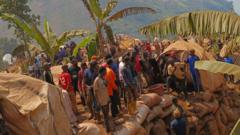In the lush Masisi Hills of North Kivu province in the Democratic Republic of Congo, the Rubaya mine stands as a critical site for coltan, a key mineral for producing electronic devices, including mobile phones. The mining area, under the control of M23 rebels, has recently been opened to journalists, revealing a workforce of over 10,000 individuals laboring tirelessly in challenging and dangerous conditions. "We usually have more than 10,000 or more people working here daily," explained Patrice Musafiri, the site's supervisor, noting the relentless work done by miners who dig up ore by hand, often experiencing perilous conditions.
High temperatures and toxic gases are part of the miners' daily reality, but many view the work as a life-changing opportunity. Miner Peter Osiasi shared that thanks to his years in mining, he has managed to save for his dowry and support a family. "Mining has really helped me," he expressed, highlighting the opportunity, albeit small, that this dangerous job offers.
The mine is located approximately 60 kilometers from Goma and is known to hold an estimated 15% of the world's coltan supply. This mineral wealth has attracted global investors, especially as the region grapples with decades of instability and conflict. With various armed groups vying for control over these resources, the complexities of the conflict further complicate the situation. Recently, significant political developments have taken shape, including ceasefire agreements between the DRC and Rwanda aimed at establishing peace in the volatile eastern region, where the M23 has gained control of several key areas.
Despite promises of better conditions, miners at Rubaya still contend with low wages and a lack of infrastructure. "Business is going on very well here because we have at least some semblance of peace, but the pay is very low," expressed Osiasi. The local sentiment calls for greater investment in community wellbeing, including improved roads, schools, and healthcare facilities alongside mining operations.
Musafiri noted that while they welcome foreign investment, it must focus on enhancing the lives of the miners. "Any foreign investor can come here, as long as they come with development for our people and increase daily wages for the miners," he insisted. As the local people cling to hopes of a definitive end to conflict, they remain aware that peace is essential not only for their livelihoods but for the community's future.
With parallel negotiation efforts led by Qatar underway, the ultimate path to stability remains uncertain. As the M23 continues to assert their presence, the situation at Rubaya represents both the challenges faced by those living under armed control as well as the potential for growth and development if peace can be achieved. The miners' appeals for better pay and lasting peace echo the urgent need for resolution in a region rich with resources but plagued by violence and uncertainty.
High temperatures and toxic gases are part of the miners' daily reality, but many view the work as a life-changing opportunity. Miner Peter Osiasi shared that thanks to his years in mining, he has managed to save for his dowry and support a family. "Mining has really helped me," he expressed, highlighting the opportunity, albeit small, that this dangerous job offers.
The mine is located approximately 60 kilometers from Goma and is known to hold an estimated 15% of the world's coltan supply. This mineral wealth has attracted global investors, especially as the region grapples with decades of instability and conflict. With various armed groups vying for control over these resources, the complexities of the conflict further complicate the situation. Recently, significant political developments have taken shape, including ceasefire agreements between the DRC and Rwanda aimed at establishing peace in the volatile eastern region, where the M23 has gained control of several key areas.
Despite promises of better conditions, miners at Rubaya still contend with low wages and a lack of infrastructure. "Business is going on very well here because we have at least some semblance of peace, but the pay is very low," expressed Osiasi. The local sentiment calls for greater investment in community wellbeing, including improved roads, schools, and healthcare facilities alongside mining operations.
Musafiri noted that while they welcome foreign investment, it must focus on enhancing the lives of the miners. "Any foreign investor can come here, as long as they come with development for our people and increase daily wages for the miners," he insisted. As the local people cling to hopes of a definitive end to conflict, they remain aware that peace is essential not only for their livelihoods but for the community's future.
With parallel negotiation efforts led by Qatar underway, the ultimate path to stability remains uncertain. As the M23 continues to assert their presence, the situation at Rubaya represents both the challenges faced by those living under armed control as well as the potential for growth and development if peace can be achieved. The miners' appeals for better pay and lasting peace echo the urgent need for resolution in a region rich with resources but plagued by violence and uncertainty.


















